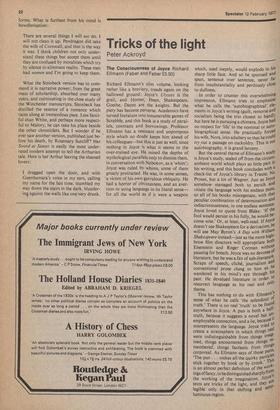Tricks of the light
Peter Ackroyd
The Consciousness of Joyce Richard Ellmann (Faber arid Faber £5.50) Richard Ellmann's slim volume, looking rather like a breviary, treads again on the hallowed ground: Joyce's Ulysses is the grail, and Homer, Ibsen, Shakespeare, Goethe, Dante are the knights. But the piety has become perverse. Academics have turned literature into innumerable games of Scrabble, and this book is a study of parallels, contrasts and borrowings. Professor Ellmann has a resonant and unpompous style which no doubt keeps him ahead of his colleagues—but this is just as well, since nothing in Joyce is what it seems to the over-trained eye. He mined the depths of mythological parallels only to dismiss them, in conversation with Nabokov, as a 'whim'; Joyce was ruled by whims, some of them greatly protracted. He was, in some senses, 'a victim of his own garrulous obliquity. He had a horror of obviousness, and an aversion to using language in its literal sense— for all the world as if it were a weapon which, used ineptly, would explode in his sharp little face. And so he spooned and spun, sentence over sentence, never far from insubstantiality and perilously close to dullness.
In order to counter this overwhelming impression, Ellmann tries to emphasise what he calls the 'autobiographical' elements in Joyce's writing (guilt, remorse and socialism being the trio closest to hand); but here he is pursuing a chimera. Joyce had no respect for 'life' in the nominal or auto' biographical sense. He practically forced his wife, Nora, into adultery so that he could tryout a passage on cuckoldry. This is not autobiography, it is grand larceny. But the central theme of Ellmann's studY is Joyce's study, sealed off from the circutnambient world which plays so little part In his writing, and this book concludes with a check-list of Joyce's library in Trieste. N° Proust, but a lot of Wagner. Just as JoYce somehow managed both to enrich and vitiate the language with his endless Puns, so all of his books miscegenate, with that peculiar combination of determination an° indiscriminateness, in one endless sentence. Joyce loved to quote from Blake: 'If the fool would persist in his folly, he would he come wise.' Or, at least, well-read. If JoYce doesn't use Shakespeare for a derivation, he will use May Byron's A Day with Shakespeare instead—just as the more high" brow film directors will appropriate both Eisenstein and Roger Corman with°tit, pausing for breath. Joyce was no devotee 0' literature, but he was a fan of sub-literature; Scraps of speech, cliché, journalism art° conventional prose clung to him as 11,e wandered in his mind's eye through his past. He devalued literature in order to resurrect language as his real and on.' theme. This has nothing to do with Ellmann's, sense of what he calls 'the splendour 01 truth.' There is no real 'truth' to be foun,? anywhere in Joyce. A pun is both a hall' truth, because it suggests a novel but tin: employable connection, and a lie, because n misrepresents the language. Joyce tried t°. create a stratosphere in which things real, were indistinguishable from things iniag, ined, things encountered from things, res membered, things fantastic from thing, corporeal. As Ellmann says of those 'The pun . .. makes all the quirky particle.: stick together by hook or by crook.' fill. is an almost perfect definition of the Nor; ings of fancy, to be distinguished sharPlY the working of the imagination. JoYce: texts are tricks of the light, and they ari" legible only in that shifting and sett) luminous region.


































 Previous page
Previous page